Features
THE NEED FOR INCREASED FUEL PRICES AND DIVESTITURE OF CEYLON PETROLEUM CORPORATION
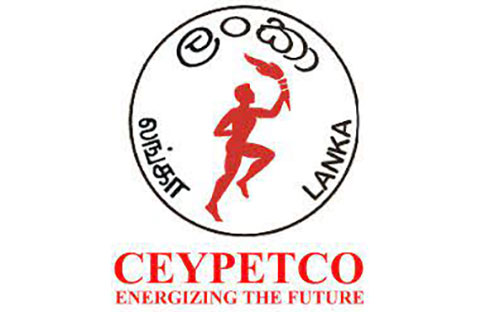
by Sanjeewa Jayaweera
In a recent TV talk show “Face the Nation”, a panel of economists mostly with experience in the private sector delivered an insightful and no holds barred discussion on the recent hike in petroland diesel prices. The participants were Murtaza Jafferjee (Chair of Advocata Institute), Nishan De Mel (Executive Director Verite Research), Dr Anila Dias Bandaranaike (Former Assistant Governor of Central Bank) and Shiran Fernando (Chief Economist of the Chamber ofCommerce).
It was good to listen to a discussion where no attempt was made to cotton wool the perilous position of the Sri Lankan economy. It was pleasing that all panelists felt that the price increase was inevitable even if taken rather late in the day. Some of the key points they made were:
Murtaza Jafferjee said, “market forces are not allowed to operate due to government interference, which prolongs the issues at hand despite creating an illusion that everything is fine. The government is trying to solve a foreign currency solvency issue by using toolsintended to manage a liquidity crisis. We spend a net amount of US $ 3.5 billion in a year on fuel imports (when the average price is US $ 70 per barrel) which is the single largest import, and that it is vital to price it correctly.
“The revised pricing, unfortunately, does not still cover the cost of diesel. The government should have done price increases in stages. In New Delhi, the price of a Liter of petrol is Rs. 250/- (SEE TABLE 1). According to a World Bank study, the fuel subsidy benefits the richest 30% of households (here) with 70% of the benefit. He proposed that to ease the burden of higher fuel cost on the poorest segment of the population, there needs to be a cash transfer, like Samurdhi benefits to that segment instead of subsidizing all and sundry.”
 His message was not to play politics with fuel prices, causing a huge hole in the economy. He was astounded that the single person income tax-free threshold of Rs.three million for a year introduced by the government in 2019 is 400 per cent of the country’s per capita income. This contrasts with countries like Singapore and Australia, both of whom have a much higher per capita income than Sri Lanka, but the tax-free threshold is only around 20% of per capita income.
His message was not to play politics with fuel prices, causing a huge hole in the economy. He was astounded that the single person income tax-free threshold of Rs.three million for a year introduced by the government in 2019 is 400 per cent of the country’s per capita income. This contrasts with countries like Singapore and Australia, both of whom have a much higher per capita income than Sri Lanka, but the tax-free threshold is only around 20% of per capita income.
Dr Anila Dias Bandaranaike said, “leadership need to make tough decisions and convince the public to undergo certain hardships to work towards a better future.” Those presently overseeing the management of the economy are out of their depth and drowning. Post-2015, when attending parliamentary oversight committees, she observed that most MP’s were absent and that many of the few who attended did not understand what was going on! She was critical of the private sector and referred to them as the NATO = No Action Talk Only! But unfortunately, she declined to comment about the role of the utterly inefficient and subservient public service of which she was part for several years!
Nishan de Mel said, “The present government reduced a plethora of taxes when it came to power, thereby significantly reducing government revenue—estimated to be around Rs. 600 billion. These measures were to act as an economic stimulus leading to economic growth. Unfortunately, no analysis has been done to determine whether these measures achieved the desired result.”
He lamented that there is a lack of economic data readily available in our country. This prevents proper monitoring and analysis of various actions resorted to by the government and hinders future planning. He cited an example of how the Central Bank has filed a court case to prevent access to certain data relating to the bond scam. They retained expensive lawyers from private practice as opposed to those from the Attorney Generals Department. The government is resorting to local borrowing to bridge the budget deficit, and by keeping the lending rates below inflation, the government is borrowing at zero cost. Our economy is in a precarious position.
The Need for a Formula for Pricing Fuel
Those who have some knowledge and understanding of how the government should manage the economy have been of the view for several decades that the government needs to price the supply of fuel, electricity, gas, and many other commodities and services based on a formula ofcost-plus profit. In 2018, the Yahapalana government did introduce a price formula. They were subjected to both criticism and ridicule. With an impending election, the practice was hastily withdrawn. A document prepared as far back 2003 proposed that the fuel price formula should be based on:
CIF price (FOB + freight + insurance + evaporation losses) to which the following costs be added (port + jetty charges + customs and excise duty + financial charges + storage and terminal charges + marketing and distribution charges) to arrive at the wholesale cost.
The retail price was to be arrived at by adding the following to the wholesale cost (profit margin of 5% + retailer and dealer margin of 2.5% of the wholesale price + VAT).Fuel prices should be revised monthly to reflect changes in Singapore Platts average FOB price and exchange rates.
It was a simple enough formula to have been implemented. No doubt there would have been periods when world oil prices spiked well above US 100 per barrel, the retail price would have been high. However, we all know that no commodity or service can be provided below costother than for a short period. Unfortunately, this type of logic has escaped those who have governed our country for so many decades.
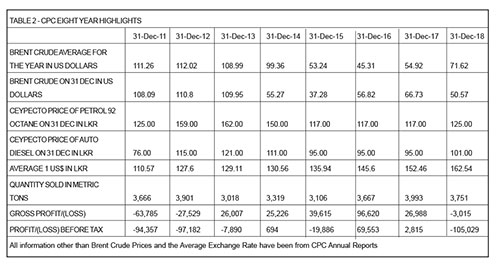 Actually, it is a case of not being able to take tough decisions at the correct time. Short-term political popularity has overridden the compelling need for sound economic management. That our country has lacked visionary leaders since Independence is evident. However, we, the masses, are equally culpable for our predicament. The quotation “people get the government they deserve” is quite apt.
Actually, it is a case of not being able to take tough decisions at the correct time. Short-term political popularity has overridden the compelling need for sound economic management. That our country has lacked visionary leaders since Independence is evident. However, we, the masses, are equally culpable for our predicament. The quotation “people get the government they deserve” is quite apt.
In addition, high fuel prices hopefully should also act as a catalyst for car owners to adopt practices such as car-pooling. The benefits extend beyond just financial to also reducing traffic jams on our roads, pollution etc.
The Losses incurred by Ceylon Petroleum Corporation (CPC)
At the outset, I must express my disappointment that the latest CPC Annual Report available is for the year ended December 31, 2018. This reflects the overall inefficiency that pervades state institutions where the work ethic is deplorable. Many companies listed on the Colombo Stock Exchange releases their Annual Reports within 90 days of the end of the financial year. An examination of the financial statements of CPC for 2018 reveals the following.
CPC posted a loss of Rs. 105 billion, of which Rs. 82.7 billion was on account of foreign exchange rate variation and a further Rs. 12.9 billion due to interest costs. Unfortunately, even at a Gross Profit Level (Revenue less direct costs), there was a loss of Rs 3 billion. TheBalance Sheet as of December 31, 2018, reflects that CPC has accumulated losses of Rs. 325.6 billion. The net assets are a negative of Rs. 281.7 billion. Borrowings were Rs. 296 billion,although there was Rs. 110.6 billion of bank deposits, investments in treasury bonds and bank balances. Other liabilities of Rs. 313 billion included foreign bills payable for imports of Rs. 245.5 billion.
CPC is insolvent, and the Auditor General has qualified his report by stating, ” The Corporation’s ability to continue as a going concern without the financial assistance from the Government is doubtful.”
I have included a table (2) detailing the eight-year history of the performance of CPC and some essential information. The absence of the financials for 2019 and 2020 prevents me from doing a 10-year analysis. As can be observed in 2011, 2012, and 2018, CPC made a loss even at Gross Profit Level and posted a loss before tax in five out of eight years. In 2011 and 2012, the average price for a barrel of Brent crude was in the region of US $ 112, and the consequences of not adjusting the fuel price are apparent. On the other hand, in 2013, despite the average cost of a barrel of Brent being US $ 109, CPC was able to post a Gross Profit of Rs. 26 billion as fuel prices were adjusted to reflect the cost.
Poor Management of CPC
Given the pivotal role that CPC plays in our economy, there is a need to ensure that people of skill, proven competence, and experience be appointed to both the Board of Directors and the key management positions. I have noted from perusing the corporation’s Annual Reports that the Executive Chairman post is like a merry go round. In the year 2017, there were three different Chairmen, whilst in 2018, there were two separate Chairmen. No organization, let alone one as large as CPC, can function effectively without continuity. In addition, the calibre of people appointed to the post of Chairman is a cause for concern.
In 2017, the Minister of Petroleum appointed his brother as the Chairman. Under any circumstances, this appointment can only be deemed as nepotism. In addition, the Chairman being a former cricketer, had no relevant experience nor proven competence and maybe the skill sets required to hold this position. The infamous hedging deal that cost the country’s taxpayers a sum over Rs. 14 billion between 2007 and 2008 occurred when another former national cricketer was the Chairman of CPC.
Do we ever learn? Another who served as Chairman in 2018 is a person whose career was in the Sri Lanka Administrative Service. With all respect, having dealt with various senior public servants in our country during my career in the private sector, I have grave reservations about their capability to hold a position that requires proven commercial acumen and expertise. A question that needs to be posed and answered by the Chairman and the Board who served the CPC in 2020 is whether they took advantage of rock bottom prices in the world market to secure our future supplies.
Auditor General’s Report On CPC
The Auditor General’s (AG) Report for 2017 and 2018 of CPC and subsidiary run into 29 and 18 pages, respectively. They are a damning indictment of maintaining poor accounting records, lax internal controls, non-adherence to Sri Lanka Accounting standards, lack of evidence for audit, non-compliance with laws, rules, regulations, poor management decisions, operating inefficiencies, and transactions of contentious nature.
Due to the constraint of space, I shall only list a few of them, although any reader interested can access the annual reports of CPC on their website www.ceypecto.gov.lk
Differences in balances payable/receivable as reflected in the accounting recordsof CPC and other parties:
A difference of Rs. 670.93 million in the inter-company balance between CPC and the Subsidiary – Ceylon Petroleum Storage Terminal Ltd., as of December 31, 2017, increased to Rs. 2.47 billion by December 31, 2018.
A balance difference of Rs. 436.78 million observed between CPC and the Department of Inland Revenue (IRD) regarding Income Tax, Economic Service Charge, and Value Added Tax payable/recoverable.
There is a balance difference of Rs. 778.3 million between CPC and the CEB as of December 31, 2018
An amount of Rs. 2.7 billion is reflected in excess as payable to Sri Lanka Customs compared with Sri Lanka Customs’ records.
No basis disclosed or audit evidence provided for the provision of Rs. 142.92 million made on inventory items to be written off.
An amount of Rs. 4.59 billion payable to the People’s Bank on account of hedging transactions between 2007 and 2009 has been excluded from the financial statements of CPC. In addition, Commercial Bank of Ceylon Plc has filed a case at the Commercial High Court, Colombo, claiming US $ 8.65 million from CPC. The total estimated loss due to the hedging transactions between 2007 and 2009 is estimated to be Rs. 14 billion.
An estimated loss of Rs. 1.5 billion because of non-implementation of collecting a monthly utility fee from CPC- owned dealer operated filling stations and Treasury owned dealer operated filling stations from January 01, 2014, onwards.
CPC has borne Rs. 53.57 million and Rs. 259.9 million during 2017 and 2018 respectively as PAYE Tax of its employees without deducting it from their personal emoluments.
A sum of Rs. 307.8 million incurred in purchasing seven motor vehicles in 2017 without the approval of the Ministry, General Treasury and the Department of Public Enterprise.
An agreement has been entered into with Hyrax Oil SDN BHD to build a Lubricant Blending Plant on a BOT basis in May 2016. No comparable proposal has been obtained, which is the acceptable procedure. The AG’s report also mentions that they could not ensure that a properfeasibility study had been conducted for the project.
The list is much longer. The Auditor-General and his staff need to be commended for their work. In most countries, an audit report of this nature would result in action against officers responsible. I believe most audit reports compiled by the Auditor General on state enterprises would be equally bad or even worse.
The Impact of fuel Prices and politicization
The Minister, in justifying the price increase said, CPC has borrowed around Rs. 600 billion from People’s Bank and Bank of Ceylon, and any further borrowing might destabilize the entire banking system.
There is no doubt that an increase in fuel prices has a ripple effect that runs across from the cost of transport to goods, resulting in hardship to some population segments. It mainly impacts the poorer segment struggling to make ends meet. The popular euphonism in Sinhalese that most opposition politicians say “gahen watuna minihata gona anna” which is equivalent to the English “from the frying pan to the fire.”
In the 2018 Annual Report, it is disclosed that CPC lost Rs. 14.7 billion due to selling kerosene below cost. The loss per litre is Rs. 56.86. The annual report states, “The subsidy on kerosene is largely misused by the transport sector when the price gap between the diesel and kerosene is more.” However, as Jafferjee said, the solution to avoid this pain is to make a cash transfer to those in the poverty net and not benefit the rest of the population.
I came across a Sri Lanka review done by the World Bank in 1996 where they say “Sri Lanka’s large array of safety nets are both costly and poorly targeted. They typically have transferred resources, albeit modest, to a large fraction of the population above the poverty line and inadequate sums to the very poor.” Unfortunately, 25 years on this statement is still applicable.
It is deplorable that politicians of both the main parties try to politicize fuel prices despite being aware of the massive negative economic impact of not pricing fuel based on the cost-plus profitformula. Their job is also to educate the public and stop childish symbolic acts of riding bullock carts, cycles and three-wheelers. The decision to import expensive vehicles for MP’s needs our unreserved condemnation. One must live hoping that action will be taken against the members of the CPC Board who in 2017 ordered seven vehicles for Rs. 307 million with no covering approval.
Conclusion
In my view, the need to privatize the Ceylon Petroleum Corporation is compelling. The government can maybe hold a majority stake of 51%. However, the management of CPC by an independent professional team outside government interference is a must. This is equally applicable to many other state corporations like the CEB, the National Water Board and Litro Gas.
I can imagine the howls of protest this will draw from the JVP, other left-wing parties, and trade unions. The opposition by the trade unions is understandable given that the staff cost at CPC for the year was Rs. 6 billion, which increased to Rs. 12.7 billion inclusive of the subsidiary company. As to whether the Rs. 259.9 million borne by CPC as PAYE tax on behalf of its employees is included or on top of this is anybody’s guess. The cost to company (CTC) of anan employee at CPC (excluding the subsidiary company) is approximately Rs. 180,000 per month.
The government must draw upon the success of the part divestiture and independent management of Sri Lanka Telecom and Sri Lankan Airlines under Emirates to restructure all loss-making institutions. These changes should have been implemented long ago, but as the panel of experts said in the Face the Nation talk show, it is better late than never.
Features
Misinterpreting President Dissanayake on National Reconciliation
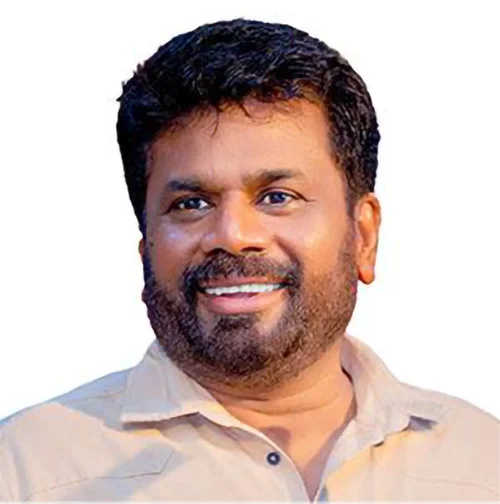
President Anura Kumara Dissanayake has been investing his political capital in going to the public to explain some of the most politically sensitive and controversial issues. At a time when easier political choices are available, the president is choosing the harder path of confronting ethnic suspicion and communal fears. There are three issues in particular on which the president’s words have generated strong reactions. These are first with regard to Buddhist pilgrims going to the north of the country with nationalist motivations. Second is the controversy relating to the expansion of the Tissa Raja Maha Viharaya, a recently constructed Buddhist temple in Kankesanturai which has become a flashpoint between local Tamil residents and Sinhala nationalist groups. Third is the decision not to give the war victory a central place in the Independence Day celebrations.
Even in the opposition, when his party held only three seats in parliament, Anura Kumara Dissanayake took his role as a public educator seriously. He used to deliver lengthy, well researched and easily digestible speeches in parliament. He continues this practice as president. It can be seen that his statements are primarily meant to elevate the thinking of the people and not to win votes the easy way. The easy way to win votes whether in Sri Lanka or elsewhere in the world is to rouse nationalist and racist sentiments and ride that wave. Sri Lanka’s post independence political history shows that narrow ethnic mobilisation has often produced short term electoral gains but long term national damage.
Sections of the opposition and segments of the general public have been critical of the president for taking these positions. They have claimed that the president is taking these positions in order to obtain more Tamil votes or to appease minority communities. The same may be said in reverse of those others who take contrary positions that they seek the Sinhala votes. These political actors who thrive on nationalist mobilisation have attempted to portray the president’s statements as an abandonment of the majority community. The president’s actions need to be understood within the larger framework of national reconciliation and long term national stability.
Reconciler’s Duty
When the president referred to Buddhist pilgrims from the south going to the north, he was not speaking about pilgrims visiting long established Buddhist heritage sites such as Nagadeepa or Kandarodai. His remarks were directed at a specific and highly contentious development, the recently built Buddhist temple in Kankesanturai and those built elsewhere in the recent past in the north and east. The temple in Kankesanturai did not emerge from the religious needs of a local Buddhist community as there is none in that area. It has been constructed on land that was formerly owned and used by Tamil civilians and which came under military occupation as a high security zone. What has made the issue of the temple particularly controversial is that it was established with the support of the security forces.
The controversy has deepened because the temple authorities have sought to expand the site from approximately one acre to nearly fourteen acres on the basis that there was a historic Buddhist temple in that area up to the colonial period. However, the Tamil residents of the area fear that expansion would further displace surrounding residents and consolidate a permanent Buddhist religious presence in the present period in an area where the local population is overwhelmingly Hindu. For many Tamils in Kankesanturai, the issue is not Buddhism as a religion but the use of religion as a vehicle for territorial assertion and demographic changes in a region that bore the brunt of the war. Likewise, there are other parts of the north and east where other temples or places of worship have been established by the military personnel in their camps during their war-time occupation and questions arise regarding the future when these camps are finally closed.
There are those who have actively organised large scale pilgrimages from the south to make the Tissa temple another important religious site. These pilgrimages are framed publicly as acts of devotion but are widely perceived locally as demonstrations of dominance. Each such visit heightens tension, provokes protest by Tamil residents, and risks confrontation. For communities that experienced mass displacement, military occupation and land loss, the symbolism of a state backed religious structure on contested land with the backing of the security forces is impossible to separate from memories of war and destruction. A president committed to reconciliation cannot remain silent in the face of such provocations, however uncomfortable it may be to challenge sections of the majority community.
High-minded leadership
The controversy regarding the president’s Independence Day speech has also generated strong debate. In that speech the president did not refer to the military victory over the LTTE and also did not use the term “war heroes” to describe soldiers. For many Sinhala nationalist groups, the absence of these references was seen as an attempt to diminish the sacrifices of the armed forces. The reality is that Independence Day means very different things to different communities. In the north and east the same day is marked by protest events and mourning and as a “Black Day”, symbolising the consolidation of a state they continue to experience as excluding them and not empathizing with the full extent of their losses.
By way of contrast, the president’s objective was to ensure that Independence Day could be observed as a day that belonged to all communities in the country. It is not correct to assume that the president takes these positions in order to appease minorities or secure electoral advantage. The president is only one year into his term and does not need to take politically risky positions for short term electoral gains. Indeed, the positions he has taken involve confronting powerful nationalist political forces that can mobilise significant opposition. He risks losing majority support for his statements. This itself indicates that the motivation is not electoral calculation.
President Dissanayake has recognized that Sri Lanka’s long term political stability and economic recovery depend on building trust among communities that once peacefully coexisted and then lived through decades of war. Political leadership is ultimately tested by the willingness to say what is necessary rather than what is politically expedient. The president’s recent interventions demonstrate rare national leadership and constitute an attempt to shift public discourse away from ethnic triumphalism and toward a more inclusive conception of nationhood. Reconciliation cannot take root if national ceremonies reinforce the perception of victory for one community and defeat for another especially in an internal conflict.
BY Jehan Perera
Features
Recovery of LTTE weapons
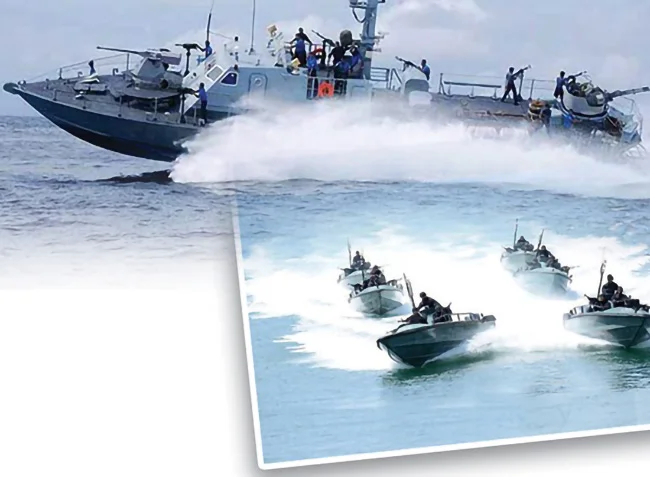
I have read a newspaper report that the Special Task Force of Sri Lanka Police, with help of Military Intelligence, recovered three buried yet well-preserved 84mm Carl Gustaf recoilless rocket launchers used by the LTTE, in the Kudumbimalai area, Batticaloa.
These deadly weapons were used by the LTTE SEA TIGER WING to attack the Sri Lanka Navy ships and craft in 1990s. The first incident was in February 1997, off Iranativu island, in the Gulf of Mannar.
Admiral Cecil Tissera took over as Commander of the Navy on 27 January, 1997, from Admiral Mohan Samarasekara.
The fight against the LTTE was intensified from 1996 and the SLN was using her Vanguard of the Navy, Fast Attack Craft Squadron, to destroy the LTTE’s littoral fighting capabilities. Frequent confrontations against the LTTE Sea Tiger boats were reported off Mullaitivu, Point Pedro and Velvetiturai areas, where SLN units became victorious in most of these sea battles, except in a few incidents where the SLN lost Fast Attack Craft.

Carl Gustaf recoilless rocket launchers
The intelligence reports confirmed that the LTTE Sea Tigers was using new recoilless rocket launchers against aluminium-hull FACs, and they were deadly at close quarter sea battles, but the exact type of this weapon was not disclosed.
The following incident, which occurred in February 1997, helped confirm the weapon was Carl Gustaf 84 mm Recoilless gun!
DATE: 09TH FEBRUARY, 1997, morning 0600 hrs.
LOCATION: OFF IRANATHIVE.
FACs: P 460 ISRAEL BUILT, COMMANDED BY CDR MANOJ JAYESOORIYA
P 452 CDL BUILT, COMMANDED BY LCDR PM WICKRAMASINGHE (ON TEMPORARY COMMAND. PROPER OIC LCDR N HEENATIGALA)
OPERATED FROM KKS.
CONFRONTED WITH LTTE ATTACK CRAFT POWERED WITH FOUR 250 HP OUT BOARD MOTORS.
TARGET WAS DESTROYED AND ONE LTTE MEMBER WAS CAPTURED.
LEADING MARINE ENGINEERING MECHANIC OF THE FAC CAME UP TO THE BRIDGE CARRYING A PROJECTILE WHICH WAS FIRED BY THE LTTE BOAT, DURING CONFRONTATION, WHICH PENETRATED THROUGH THE FAC’s HULL, AND ENTERED THE OICs CABIN (BETWEEN THE TWO BUNKS) AND HIT THE AUXILIARY ENGINE ROOM DOOR AND HAD FALLEN DOWN WITHOUT EXPLODING. THE ENGINE ROOM DOOR WAS HEAVILY DAMAGED LOOSING THE WATER TIGHT INTEGRITY OF THE FAC.
THE PROJECTILE WAS LATER HANDED OVER TO THE NAVAL WEAPONS EXPERTS WHEN THE FACs RETURNED TO KKS. INVESTIGATIONS REVEALED THE WEAPON USED BY THE ENEMY WAS 84 mm CARL GUSTAF SHOULDER-FIRED RECOILLESS GUN AND THIS PROJECTILE WAS AN ILLUMINATER BOMB OF ONE MILLION CANDLE POWER. BUT THE ATTACKERS HAS FAILED TO REMOVE THE SAFETY PIN, THEREFORE THE BOMB WAS NOT ACTIVATED.
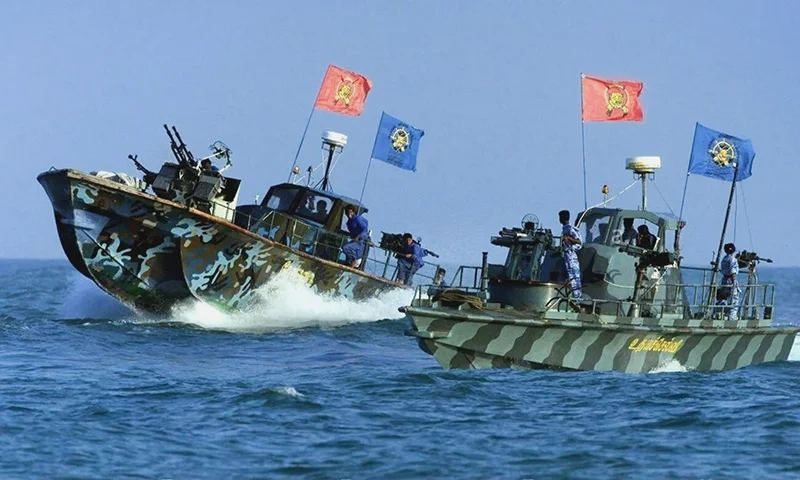
Sea Tigers
Carl Gustaf 84 mm recoilless gun was named after Carl Gustaf Stads Gevärsfaktori, which, initially, produced it. Sweden later developed the 84mm shoulder-fired recoilless gun by the Royal Swedish Army Materiel Administration during the second half of 1940s as a crew served man- portable infantry support gun for close range multi-role anti-armour, anti-personnel, battle field illumination, smoke screening and marking fire.
It is confirmed in Wikipedia that Carl Gustaf Recoilless shoulder-fired guns were used by the only non-state actor in the world – the LTTE – during the final Eelam War.
It is extremely important to check the batch numbers of the recently recovered three launchers to find out where they were produced and other details like how they ended up in Batticaloa, Sri Lanka?
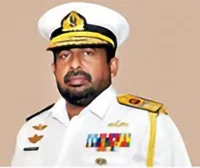 By Admiral Ravindra C. Wijegunaratne
By Admiral Ravindra C. Wijegunaratne
WV, RWP and Bar, RSP, VSV, USP, NI (M) (Pakistan), ndc, psn, Bsc (Hons) (War Studies) (Karachi) MPhil (Madras)
Former Navy Commander and Former Chief of Defence Staff
Former Chairman, Trincomalee Petroleum Terminals Ltd
Former Managing Director Ceylon Petroleum Corporation
Former High Commissioner to Pakistan
Features
Yellow Beatz … a style similar to K-pop!

 Yes, get ready to vibe with Yellow Beatz, Sri Lanka’s awesome girl group, keen to take Sri Lankan music to the world with a style similar to K-pop!
Yes, get ready to vibe with Yellow Beatz, Sri Lanka’s awesome girl group, keen to take Sri Lankan music to the world with a style similar to K-pop!
With high-energy beats and infectious hooks, these talented ladies are here to shake up the music scene.
Think bold moves, catchy hooks, and, of course, spicy versions of old Sinhala hits, and Yellow Beatz is the package you won’t want to miss!
According to a spokesman for the group, Yellow Beatz became a reality during the Covid period … when everyone was stuck at home, in lockdown.
“First we interviewed girls, online, and selected a team that blended well, as four voices, and then started rehearsals. One of the cover songs we recorded, during those early rehearsals, unexpectedly went viral on Facebook. From that moment onward, we continued doing cover songs, and we received a huge response. Through that, we were able to bring back some beautiful Sri Lankan musical creations that were being forgotten, and introduce them to the new generation.”
The team members, I am told, have strong musical skills and with proper training their goal is to become a vocal group recognised around the world.
Believe me, their goal, they say, is not only to take Sri Lanka’s name forward, in the music scene, but to bring home a Grammy Award, as well.
“We truly believe we can achieve this with the love and support of everyone in Sri Lanka.”
The year 2026 is very special for Yellow Beatz as they have received an exceptional opportunity to represent Sri Lanka at the World Championships of Performing Arts in the USA.
Under the guidance of Chris Raththara, the Director for Sri Lanka, and with the blessings of all Sri Lankans, the girls have a great hope that they can win this milestone.
“We believe this will be a moment of great value for us as Yellow Beatz, and also for all Sri Lankans, and it will be an important inspiration for the future of our country.”
Along with all the preparation for the event in the USA, they went on to say they also need to manage their performances, original song recordings, and everything related.

The year 2026 is very special for Yellow Beatz
“We have strong confidence in ourselves and in our sincere intentions, because we are a team that studies music deeply, researches within the field, and works to take the uniqueness of Sri Lankan identity to the world.”
At present, they gather at the Voices Lab Academy, twice a week, for new creations and concert rehearsals.
This project was created by Buddhika Dayarathne who is currently working as a Pop Vocal lecturer at SLTC Campus. Voice Lab Academy is also his own private music academy and Yellow Beatz was formed through that platform.
Buddhika is keen to take Sri Lankan music to the world with a style similar to K-Pop and Yellow Beatz began as a result of that vision. With that same aim, we all work together as one team.
“Although it was a little challenging for the four of us girls to work together at first, we have united for our goal and continue to work very flexibly and with dedication. Our parents and families also give their continuous blessings and support for this project,” Rameesha, Dinushi, Newansa and Risuri said.
Last year, Yellow Beatz released their first original song, ‘Ihirila’ , and with everything happening this year, they are also preparing for their first album.
-

 Features2 days ago
Features2 days agoMy experience in turning around the Merchant Bank of Sri Lanka (MBSL) – Episode 3
-

 Business3 days ago
Business3 days agoZone24x7 enters 2026 with strong momentum, reinforcing its role as an enterprise AI and automation partner
-

 Business2 days ago
Business2 days agoRemotely conducted Business Forum in Paris attracts reputed French companies
-

 Business2 days ago
Business2 days agoFour runs, a thousand dreams: How a small-town school bowled its way into the record books
-

 Business2 days ago
Business2 days agoComBank and Hayleys Mobility redefine sustainable mobility with flexible leasing solutions
-

 Business3 days ago
Business3 days agoHNB recognized among Top 10 Best Employers of 2025 at the EFC National Best Employer Awards
-

 Business3 days ago
Business3 days agoGREAT 2025–2030: Sri Lanka’s Green ambition meets a grid reality check
-

 Editorial5 days ago
Editorial5 days agoAll’s not well that ends well?













